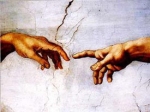Verse: Lev 16:8-9 And Aaron shall cast lots over the two goats, one lot for the Lord and the other lot for Azazel. ESV
On the day of Yom Kippur, the high priest performed a sacrifice that was like no other in all of the
Tabernacle/Temple worship.
This sacrifice involved two identical goats that were to be the same in
every way, including their value in money, and it was preferred that they were purchased at the same
time. (The Temple, It’s Ministry and Services by Alfred Edersheim pp248-259.) All this was to emphasize
that the two animals were actually a single sacrifice.
After the ritual cleansing by the high priest for himself and the physical articles of the temple, as well as
petition prayers for the remission of the sins of the nation, the two goats were presented facing the
people and one was chosen by lot. One was designated “for YHWH” and the other “for Azazel”. The goat
for YHWH had a scarlet cloth tied around its neck and the one for Azazel had a scarlet cloth tied around
its horn.
“Azazel” (Strongs number 5799) is translated in the King James as “scapegoat” and is defined as
“the goat of departure, scapegoat” and it occurs only 4 times in the whole of the Bible all of
which are in Leviticus 16. This word and the message it is telling us is of particular significance.
There is nothing like it in all of scripture so we need to pay particular attention to this sacrifice
and the message it conveys. The term “scapegoat” is carried through to this day in our culture as
the one who takes the punishment and blame for the transgressions and sin of others even
though the “scapegoat” is not guilty. This term is used by those outside of the church as well as
those in it. The goat “for Azazel” and this unusual Hebrew sacrifice is the origination of this
phrase.
The goat designated for YHWH was killed and the blood sprinkled seven times in the Holy of Holies. The
goat for Azazel remained outside of the Tabernacle (or Temple) facing the people until the high priest
came out from the Holy of Holies and laid his hands on the head of the goat with the scarlet cloth
around its neck. With a special prayer, the high priest imputed the sin of all the people onto the second
goat. The goat was led off to “a place not inhabited” (Leviticus 16:22). Tradition tells us that in Jesus’
day the wilderness was ninety stadia (about 11 miles) from the city of Jerusalem. The goat was led
through the eastern gate by a designated person and the goat was backed off of a steep cliff where it
met its end.
The imputing of transgressions for the nation of Israel was laid upon the goat that was led off into the
wilderness, not the one whose blood was sprinkled in the presence of God in the Holy of Holies.
What does this mean for us?
Remember that the feasts and the Temple systems are types and shadows of heavenly things (Hebrews
8:5) and they are accurate. The sacrifice of these two goats shows us exactly the propitiation of the
Lamb of God, Jesus Christ. Jesus gave His life for us on the cross and His life blood was poured out for
the remission of our sin. But there is more.
Jeremiah 31:31-34
"Behold, the days are coming, declares the Lord, when I will make a new covenant with the
house of Israel and the house of Judah, 32 not like the covenant that I made with their fathers
on the day when I took them by the hand to bring them out of the land of Egypt, my covenant
that they broke, though I was their husband, declares the Lord. 33 But this is the covenant that I
will make with the house of Israel after those days, declares the Lord: I will put my law within
them, and I will write it on their hearts. And I will be their God, and they shall be my people. 34
And no longer shall each one teach his neighbor and each his brother, saying, 'Know the Lord,'
for they shall all know me, from the least of them to the greatest, declares the Lord. For I will
forgive their iniquity, and I will remember their sin no more." ESV
So we can clearly see the promise of Jeremiah rehearsed and demonstrated every year from Exodus to
the Crucifixion through the unusual sacrifice of the two goats. This is the great judgement of YHWH, that
our sins are forgiven AND they are removed forever. This day is a solemn day. It is indeed a holy day,
that is to say, a day set completely apart from every other day. It is also important for us to understand
that our job in this great expiation is to do nothing. We have nothing to add to it or participate in it.
Leviticus 16:29-32
"And it shall be a statute to you forever that in the seventh month, on the tenth day of the
month, you shall afflict yourselves and shall do no work, either the native or the stranger who
sojourns among you. 30 For on this day shall atonement be made for you to cleanse you. You
shall be clean before the Lord from all your sins. 31 It is a Sabbath of solemn rest to you, and
you shall afflict yourselves; it is a statute forever. ESV
No work, no washing, no feeding ourselves, and no one helping or serving us in any way. There is no
action, no special food or drink, no incantations, and no actions we can perform that can assist YHWH or
to which we can boast. This is a solemn day for the mercy of God to be made known, as He and He alone
makes us to stand righteous before Him and fellowship in the beauty of His holiness. The hardest thing
for us to do sometimes is to do nothing, to be silent--knowing our guilt and having no excuses or
justifications before God or anyone else.
But the results of this day point us to the greatest act of mercy we can ever experience!
1 John 3:1-3
3:1 SEE WHAT [an incredible] quality of love the Father has given (shown, bestowed on) us, that
we should [be permitted to] be named and called and counted the children of God! And so we
are! The reason that the world does not know (recognize, acknowledge) us is that it does not
know (recognize, acknowledge) Him.
2 Beloved, we are [even here and] now God's children; it is not yet disclosed (made clear) what
we shall be [hereafter], but we know that when He comes and is manifested, we shall [as God's
children] resemble and be like Him, for we shall see Him just as He [really] is
3 And everyone who has this hope [resting] on Him cleanses (purifies) himself just as He is pure
(chaste, undefiled, guiltless). AMP
YHWH says, “Your sins are forgiven and I will remember them no more!” What a sweet sound of relief,
what a precious Sabbath indeed!





Terms & Conditions
Subscribe
Report
My comments